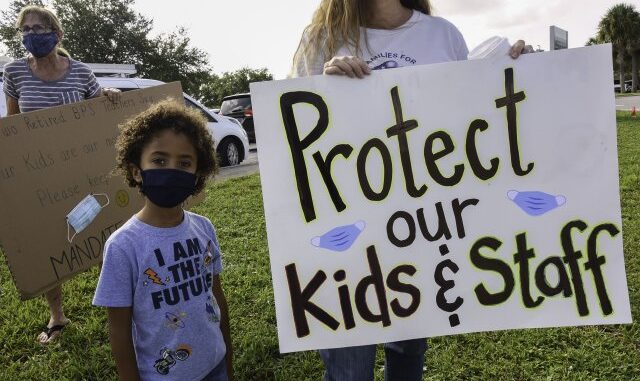
As the academic year unfolds, the conversation surrounding mask mandates in schools remains a polestar of contention. Parents, educators, and policymakers are voicing disparate opinions, underscoring the nuanced balance between public health and personal freedom.
Public Health versus Personal Rights
In one corner stands the public health argument. Proponents of mask mandates in educational institutions cite CDC guidelines and scientific studies that suggest masks can mitigate the spread of airborne illnesses. The keyword here is ‘safety,’ a term that resonates deeply with parents and guardians. Ensuring a safe learning environment for children is paramount, and many believe that face coverings are a simple yet effective tool in this ongoing battle against viral transmissions.
The Economics of Education and Health
On the flip side, there’s a robust conversation about the economics of health measures. School districts have to grapple with budget constraints and the financial implications of enforcing mask-wearing. Some argue that funds could be better allocated to improve virtual learning infrastructures or to increase the physical space in classrooms to allow for social distancing. Keywords like ‘budget-friendly solutions’ and ‘cost-effective measures’ are increasingly prevalent in school board meetings and district budget discussions.
Mental Health and Emotional Well-being
The debate extends beyond physical health and economics. Mental health advocates highlight the potential emotional and psychological impact of prolonged mask usage on students. Communication is often hampered by masks, with concerns raised about the implications for speech development and social interaction. The term ’emotional wellness’ has thus become a cornerstone of the argument against mandates, emphasizing the importance of visible facial expressions and smiles in the classroom.
Legal Precedents and Civil Liberties
Moreover, the legal aspect of mask mandates has brought terms like ‘civil liberties’ and ‘legal precedents’ into the forefront. Legal scholars and civil rights activists question the constitutionality of enforced mask-wearing, igniting a fiery debate on the rights of individuals versus collective responsibility. The discourse around ‘personal freedom’ is complex and intensely personal, with a spectrum of interpretations influencing policy at the local and state levels.
Educational Adaptability and Flexibility
The education system’s adaptability is also under scrutiny. As districts pivot between in-person and remote learning, terms such as ‘adaptive learning environments’ and ‘flexible educational models’ dominate discussions. The adaptability of schools is tested not only by mask mandates but also by the broader context of the global health crisis and the need for schools to remain agile and responsive.
Parental Choice and Advocacy
‘Parental choice’ has become a rallying cry for those who believe that decisions about children’s health and safety should lie with the parents or guardians. Advocacy groups argue for the right to choose whether their child wears a mask at school, positioning it as a fundamental parental responsibility. This aspect of the debate touches on the broader themes of parental rights in education and the extent of government intervention.
Technological Solutions and Innovations
In the quest for compromise, technology offers a glimmer of hope. Keywords like ‘innovative air filtration systems’ and ‘touchless temperature screening’ have emerged, suggesting that technological advancements may present alternative strategies to reduce the spread of illnesses without the need for mask mandates.
Global Perspectives on Education and Health
Comparatively, looking at the global perspective enriches the dialogue. Countries around the world have approached the mask mandate question with varying degrees of strictness, providing a wider context in which to evaluate effectiveness. ‘Global health metrics’ and ‘international educational standards’ are often invoked to gauge where the United States stands in its health and educational policy decisions.
The Role of Vaccinations in the Debate
The rollout of vaccinations has added another layer to the discourse, with terms like ‘herd immunity’ and ‘vaccination rates’ becoming intertwined with the mask mandate debate. The interplay between vaccination accessibility and mask-wearing requirements is a subject of particular interest to epidemiologists and public health officials.
Local Governance and School Autonomy
The principle of ‘local governance’ surfaces in discussions about the appropriateness of state versus local decision-making. School autonomy is championed by those who believe that mask-related decisions should reflect the specific needs and circumstances of individual communities.
Inclusive Educational Practices
Advocates for inclusive education stress the importance of ‘accessibility’ and ‘equitable learning conditions’ for all students, including those with disabilities or health conditions that may be impacted by mask requirements.
The Future of Public Health Education
As we consider the long-term implications, the concept of ‘public health education’ becomes pivotal. Educating students and families about the role of public health practices, including mask-wearing, in preventing disease is essential.
The Intersection of Science and Policy
Throughout the debate, the importance of grounding decisions in science is paramount. The phrase ‘evidence-based policy’ is cited by both sides, with each presenting data to support their position.
Balancing the Scales: A Conclusion
The ongoing discussion about mask mandates in schools reflects the broader societal challenge of balancing individual rights with the common good. As the country continues to navigate these uncharted waters, it becomes increasingly clear that no single solution will satisfy all stakeholders. The terms ‘compromise’ and ‘common ground’ may offer the best guidance for policymakers as they seek to protect both the health and the rights of the nation’s children.